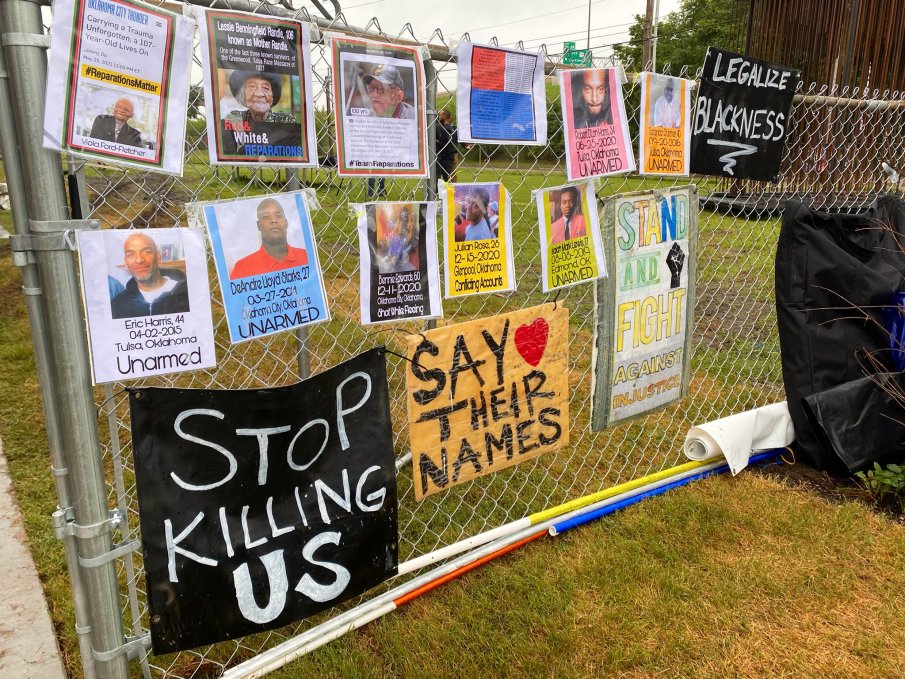
More than 20 years after a state commission recommended creating a college scholarship as one means of redress for the Tulsa Race Massacre, Oklahoma lawmakers have approved $1.5 million in new funding for the program.
The new funding will create more opportunities for Tulsa students, said Rep. Regina Goodwin, D-Tulsa, who requested the money.
“Through this program, generations that have never gone to college can be educated,” Goodwin said. “They can establish businesses or work in the field of their choice. And they can begin to create generational wealth.”
But there’s still more work to be done.
State lawmakers originally envisioned the Tulsa Reconciliation Scholarship would help descendants of those who lost businesses and homes in the 1921 massacre regain lost generational wealth through funding for college. But the Oklahoma State Regents for Higher Education, which administers the scholarship, has not prioritized descendants in the selection process or provided significant funding for the program.
In a response to The Frontier, Kylie Smith, the vice chancellor for administration for the State Regents, said the agency has been focused on funding Oklahoma’s public universities after budget cuts rather than seeking more money for the scholarship.
The State Regents has awarded students of various racial backgrounds scholarships since the program began in 2003, according to state data. Out of 59 scholarship recipients over the past eight years, 34 reported they had at least some Black ancestry. Fourteen did not report their race or ethnicity. Eight reported their race not as Black but Hispanic, Asian or Native American.
“We need to be more mindful that the most impacted group was Black folks,” Goodwin said. “More than 300 Black folks were murdered. 1,256 homes destroyed. Those were Black homes. Those weren’t white folks’ homes. We can’t run away from that.”
The scholarship’s nomination form also doesn’t ask whether students have any ancestral link to the massacre, although state law permits using public records to determine this during the selection process.
Goodwin authored a bill to change this and other issues that garnered bipartisan support. However, the proposal wasn’t given a hearing on the Senate floor before the end of the last regular legislative session in May.
But the State Regents may be able to implement some of the changes Goodwin wants without changing the law. With the new infusion of funding from the Legislature the State Regents will review its process for awarding future scholarships, Smith said.
Underfunded and underutilized
In 2001, a bipartisan state commission found that a white mob, aided by local law enforcement and the Oklahoma National Guard, systematically destroyed the homes and businesses of thousands of Greenwood residents during the 1921 Tulsa Race Massacre.
The incident is considered by many to be the single worst episode of racial violence in American history and led to a vast loss of generational wealth among Black Tulsans. To help descendants regain some of this wealth, the report recommended the state create a “scholarship fund for students affected by the Tulsa Race Riot.”

The commission’s report did not specify how many scholarships should be awarded each year or the amount. But former Rep. Don Ross, D-Tulsa — the author of a resolution that created the commission — and the late Sen. Maxine Horner, D-Tulsa, who co-authored a 2001 bill establishing the scholarship, envisioned a program that would cover up to full college tuition for “not less than 300” students.
“Of course, this was aspirational,” said Goodwin.
But the Oklahoma Legislature and the State Regents have never provided enough funding to the program to give Tulsa students significant tuition assistance. Since the program was established, an average of only eight $1,000 scholarships have been awarded per year.
The program has also remained underfunded compared to the two other specialized scholarships that public dollars fund. The Chiropractic Education Scholarship Program awarded $196,500 in state funds to chiropractic students from 2014 to 2021. During these same years, the Tulsa Reconciliation Scholarship only allocated $40,000 in scholarships.
The state also plans to spend $41 million over the next five years on the Oklahoma Future Teachers Scholarship program, which provides funding to students studying education.
The Legislature never recommended or required a specific amount of funding for the Tulsa Reconciliation Scholarship, but the State Regents began putting between $30,000 and $50,000 each year into a trust fund for the program in 2003. The funds were then invested and the earnings used to award scholarships.
The State Regents never received any additional funding for the program from the Legislature or private donors, except in 2003 when Oklahoma taxpayers were given the option to donate their tax refund to the program. But taxpayers only donated $9,407 over six years — and the option was shut down in 2009 due to a lack of interest.

To donate to The Frontier and help support our efforts to grow investigative journalism in Oklahoma, click here.
Goodwin is grateful for the money the State Regents has allocated for the scholarship, but said funding has been inconsistent. She noted that the State Regents did not award any scholarships one year and also stopped allocating funding to the trust in 2019.
Three past scholarship recipients from Tulsa, Lisa Holmes, Missy Daniels, and Brandon Oldham, told The Frontier more funding could have helped them avoid taking on more debt from student loans, which some of them are still working to pay off.
Oldham, the salutatorian of his class at Central High School, mentioned he had an ancestor whose business was destroyed in the massacre.
“More scholarship money would have been much appreciated as I am still working to pay off loans,” he said.
Holmes and Daniels also said they were first-generation college students.
Another 2003 recipient, who didn’t want her name published for job-related reasons, told The Frontier she was grateful for the help, but the $1,000 scholarship she received barely paid for her books. After graduating high school in the top 10% of her class, she attended Oklahoma State University, but said she was unable to graduate due to a lack of funding.
The State Regents will add the newly-approved $1.5 million for the scholarship, growing the fund’s total to $2.3 million. This sum will be invested and State Regents will determine the number of scholarships it can give and the amount based on the fund’s yearly earnings. Goodwin also said the State Regents has promised to resume adding new money to invest in the fund each year.
Last week, the State Regents decided to give 26 students $2,000 scholarships for the upcoming school year. Recipients can also reapply for funding in future years and will receive priority.
Goodwin has also asked the State Regents to award two students full-tuition scholarships next year. The scholarships would cover one year of college tuition (and recipients can also reapply).
Prioritizing Greenwood descendants
Moving forward, Goodwin would like descendants of massacre survivors to have first preference for scholarships and later North Tulsa residents still affected by the long-lasting damage to the local economy second. Students who may not have ties to the community, but who are enthusiastic about preserving its history would come third.
The State Regents’ latest set of policy procedures from 2021 do not reflect Goodwin’s ideal. A student’s ancestral connection to the massacre is the last variable the State Regents take into account when awarding scholarships. Only if three measures of financial need do not sufficiently narrow the pool of nominees will they use one’s descendant status. Goodwin notes this has likely never happened.
In response to these problems, Goodwin introduced House Bill 4154 in February, which would have required the selection committee to give preference to descendants.
The bill would have also raised the maximum household income of applicants from $70,000 to $120,000 per year and allowed descendants residing in other parts of the state — not just Tulsa — to apply.
The bill saw initial success. It passed the House of Representatives by a margin of 68 to 19 with strong bipartisan support. It saw similar success in two House and two Senate committees.
Despite this, the proposal wasn’t heard on the Senate floor.
Sen. George Young, D-Oklahoma City, the Senate co-sponsor of the bill, said he was frustrated the proposal didn’t get a hearing. He blames squabbles with Senate leadership regarding other legislative issues.
“It bothers me when, talking about something like the Tulsa Race Massacre, we would allow politics to enter into it to such a degree that it would stop the legislation,” Young said.
The Frontier contacted Senate President Pro Tempore Greg Treat, R-Oklahoma City, to ask why HB 4154 was sidelined. Treat has the authority to decide which bills are heard in the Senate. His office did not respond to multiple requests for comment.
While the bill didn’t pass, Goodwin is hopeful she can collaborate with the State Regents to make some of the changes she proposed without changing the law, although restrictions on income and geographical limits can’t be modified without the Legislature’s approval.
Goodwin says the agency, particularly under the new leadership of Chancellor Allison Garrett, has been receptive to working with her.
“We can impress upon them that current law says descendants may have preference and we can say to them: ‘Let’s consider the descendants; let’s remember that this was born out of a report that dealt with the 1921 race massacre,’” Goodwin said. “We absolutely can have that conversation and we’re going to.”
A first step
Goodwin and Young both said more scholarship funding is a positive first step, but maintain that the state needs to do more to address long-lasting economic harm from the Tulsa Race Massacre.
In addition to establishing a scholarship fund, the state commission’s 2001 report on the massacre also recommended paying direct reparations to victims and descendants as well as implementing policies to stimulate economic growth in the Greenwood District.
Dreisen Heath, a researcher at Human Rights Watch who has studied the massacre, commended Goodwin for obtaining new funding for the scholarship, but said the state needs to do more to repair the damage to Greenwood given the Oklahoma National Guard’s complicity in the attack.
Goodwin also introduced bills this year to create a $300 million victims’ compensation fund for the massacre and a $400,000 study on removing Interstate 244, which cut through Greenwood in the 1970s, displacing businesses and homes. These bills were not heard in the House of Representatives.
While Goodwin says she’s unsure what the Legislature will have an appetite for going forward, she sees her success in securing the scholarship’s new funding as a hopeful beginning.
“I thank God we got this far,” she said.
A descendant of Tulsa Race Massacre survivors, Goodwin says she has a moral obligation to continue fighting.
“I owe it to all those that have died, all those that lost property, all those that lost generational wealth,” Goodwin said. “I would not be doing my job if, 101 years later, I’m not still talking about this and still not trying to seek justice.”

